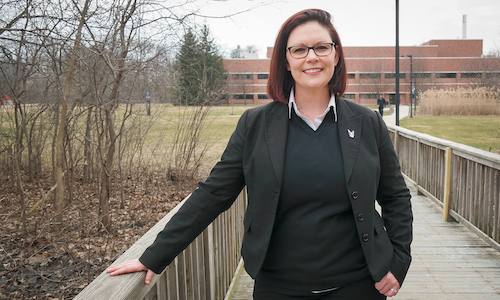
In the nearly 30 years since the passage of the Americans with Disabilities Act (ADA), many accommodations designed for physical disabilities, like wheelchair ramps, automatic doors, and accessible websites, have become familiar parts of our workplaces. But when it comes to similar accommodations for mental health, Social Work Assistant Professor Jessica Camp said employee protections are often far less robust.
Part of the reason for that, Camp said, is provisions for mental illness (and learning disabilities) weren’t added to the ADA until 2008. But it’s also because accommodations for mental health often require more nuanced approaches—including ones that challenge unspoken values of American workplace culture.
“For example, we have some idea of what it means to move the desks in our offices a little farther apart so a co-worker with a wheelchair can move easily,” Camp said. “But let’s say you’re somebody who struggles with depression, and you’ve just switched your medication, which makes you drowsy in the morning. So it would be better if you could come in later and stay later. The problem is, in our workplaces, accommodations like schedule flexibility are often seen as privileges you earn with seniority. Outside of that context, it can be cast as a weakness.”
Because of issues like this, Camp said many with mental health disorders choose to forgo asking for something that could be considered special treatment, and instead try to “pass” as best they can—a kind of struggling in silence that can impact an employee’s day-to-day work performance, opportunities for promotions and career longevity.
In fact, in her analysis of U.S. census data, Camp found that while economic disparities exists for all categories of disabilities, Americans with mental health disorders and learning disabilities have far less economic mobility and labor market opportunity than those with physical and sensory disabilities. This is the case despite the fact that individuals with these types of disabilities self-report less severe and more episodic impacts on their working lives.
“One of the things we understand about persistent mental health disorders is that they generally start in early adulthood,” Camp said. “That also tends to be the time you’re getting your college degree or landing that first big job that allows you to build your career. So you may just need support during that part of your life. But if you don’t get it, it can create a pause in your work life that can have serious economic consequences.”
Camp’s research now is focused on building programs and policies designed to keep those moments from becoming life events that permanently stunt a person’s economic mobility.
For example, in her work with the Office of Metropolitan Impact, she is examining the impact that trauma has on disconnecting high school, pre-college and college students from important educational and work opportunities.
And Camp said this strategy also has implications for university policy, including in the area of student retention. During her year-long tenure as UM-Flint’s student success fellow, she discovered that the single biggest factor in a student no longer continuing their education was getting a D or lower in a single class.
“They weren’t bombing out,” Camp said. “They had a single disconnecting experience that then led to them leaving the university altogether.” In that case, her finding led to a creative recommendation: A “freebie” policy, in which students could drop a single low score during their academic careers with no financial penalties.
Camp now is lending her expertise to the ongoing student retention conversation at UM-Dearborn. Specifically, she’s working closely with Counseling and Disabilities Director Sara Byczek to explore ways university faculty and staff can support students struggling with mental illness and substance abuse.
“We know that your college years are often a time of elevated stress and transition, but we used to think that part of our students’ lives wasn’t really our business,” Camp said. “Now, universities are starting to acknowledge that it’s a critical part of keeping our students connected and retained. And the stronger our system is for identifying and supporting students who might be experiencing a crisis, the better we’ll be at helping them continue their education.”




